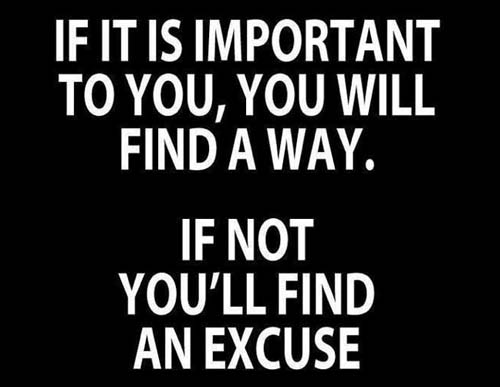Success Advice
7 Common Excuses That Are All In Your Head

What would you say if I told you that you’re a great actor? Honestly, it’s true.
In fact, you’re so good that you’ll probably be among the nominees at next year’s Oscar’s.
You’re probably wondering what on earth I’m talking about, so here’s my reasoning…
The best actors are able to fully immerse themselves into their role. They live and breathe their part – adopting the many traits and mannerisms contained within. Some of whom take this so seriously they stay in character, even when the cameras aren’t rolling.
This is you.
You’ve put so much effort into believing the lies you’ve been telling yourself, that you’re now struggling to differentiate between your true self and this imposter that’s infesting your mind.
This character is a deadbeat and a coward. Your performance is legendary, but you were born to play a different role. You were born to play someone courageous; a character who took believed in their own potential for success.
Hey, if Matthew McConaughey can turn his career around – who’s to say you can’t do the same thing?
Trust yourself to make the right decisions. Focus on who you want to be. Accept the good and the bad with equal measure. Follow your instincts and cut out all of the excuses which simply don’t exist, such as;
1. I can’t earn a decent income because I have no qualifications
Throughout life we are told that education is the bedrock of success. From an early age we are raised with the belief that we must follow the well-trodden path and that any deviation will result in failure.
So it stands to reason that many of you reading this will believe that an absence of a diploma or a degree will render you at a disadvantage. Yes, it’s possible – in certain situations. But where one door remains locked, several will swing open.
A lack of qualifications will only prevent someone from deciding if you’re worthy. Do you need another person to grant you permission to earn the income you desire?
Many of this planet’s most successful people dropped out of college. Steve Jobs, Mark Zuckerberg, Bill Gates and Ted Turner seem to be doing alright – because they chose their own path.
So can you.
2. I’m too old to be doing this
Unless you’re trying to embark on an athletic career at the age of 45 this is one excuse that you should never catch yourself using. Age is an arbitrary number which we use way to often as a means to handicap our ambition and creativity.
Brendan Gleeson decided at the age of 34 that being a maths teacher wasn’t the life he envisioned for himself, so what did he do? He quit his job to become actor. Brendan began attending auditions and landed small roles in various TV movies but it wasn’t until Mel Gibson cast him in Braveheart that he would have his major breakthrough. Now he has several Golden Globe nominations and is one of the world’s most respected actors.
Blues musician, Seasick Steve had to wait 57 years before finally achieving chart success with his 2008 album ‘I Started Out with Nothin and I Still Got Most of It Left’. After spending the majority of his life as a struggling session musician and several years spent living as a hobo, he had to watch countless other artists live the dream before getting his shot at the big time.
If you’re worried that time is running out and success hasn’t found you yet – I have a bit of advice; Go and find it yourself.
3. I’m worried that everyone will laugh at me
People will always notice that which is different. It’s hardwired into our DNA. We seek out anything that is slightly out of the norm. Do you remember how your new hairstyle was ridiculed at school for no other reason than it was different than the day before?
We carry this fear into our adult lives. Whether it’s something major like a change in career, taking up a new hobby or something as trivial as a trip to the Barber’s – we become so dependent on the approval of our peers that we’re almost paralysed into mediocrity.
You should never feel ashamed for being the person you want to be. You should never walk away from achieving a goal because you’re worried about what other people may think. If something feels right. If your instincts are dragging you towards a future that you deserve then seriously, what the hell has it got to do with anyone else?
If other people choose to laugh because you’re daring to do something different, don’t worry. They are only laughing at themselves.

4. My life is hectic right now – I’m too busy
What makes you so special?
If we’re all given the same hours each day, what separates those who make use of their time from those who allow it slip by? That’s right – you’re lazy. I bet you waste several hours a week watching mindless television that could be better spent mastering your craft. I bet that you regularly sleep in late and waste your days off because you lack the discipline required to start your day the right way. I’m also willing to bet that your life is so disorganised that you have no idea how much free time you genuinely have to play around with.
Margaret Thatcher used to free up more time by only allowing herself 4 hours sleep each night.
Award winning author Geoff Thompson wrote his first book whilst sitting on the toilet at the job he hated.
Arnold Schwarzenegger would regularly sneak out of his military camp just so he could find the time to train.
Successful people will always find a way of overcoming their obstacles by stealing time where possible. The truth is that you don’t need more time, it’s already there. You just need to stop dithering and actually make use of it before it eventually runs out.
5. I’m waiting for the right time
Help me out here. What’s the right time – next week? Next year? 6.47 pm?
You’re hesitating. Maybe through fear, a lack of confidence or just laziness – you’re definitely hesitating, and it’s about time you did something about it.
You see, there is no tomorrow. The present is the only time that actually exists. Every moment in the past and every possible moment in the future will take place in the present. We are terrible at planning ahead. There are parts of our brain that are stimulated when we think about ourselves, and there are parts of our brain that light up when we think of others.
The interesting part is that when we think of our future selves, the part of our brain that gets used is that for other people. The person that wakes up tomorrow morning isn’t going to be the same person who made that promise today. Why would you trust a stranger with your life?
I admit, not all tasks can be carried out today, but at the very least you should be doing something; putting the wheels in motion and taking that first step.
The only time is now. Make it count.
6. I can’t do it, it’s too difficult
What’s too difficult?
Running a marathon is 26.2 miles of screaming lungs and burning quads. Those who finish can barely walk afterwards – and it’s even been known to claim a few lives in the process. But let me ask you this. Can you put on a pair of trainers and run around the block? Every endurance race begins with an easy training session.
Earning that big promotion requires you to successfully hit those sales targets. In a pressure cooker environment, only the most consistent performers will be considered. But let me ask you this. Are you able to treat your next customer with 100% focus and attention? Targets are achieved 1 sale at a time.
Every goal can be broken down into smaller chunks. Don’t try and take on the world today – leave that for another time. But also ask yourself this; if it’s not difficult, is it worth doing?
Being realistic is the most commonly travelled road to mediocrity.
7. There is an ‘us’ and ‘them’
If you have ever quit something, or worse, resisted from even trying because you believe that you somehow lack the natural ‘talent’ to succeed then please slap yourself in the face.
Seriously, I’ll wait here…
How did that feel? Did it hurt? Man up.
There is no ‘us’ and ‘them’. For the majority of skills, disciplines and career choices, there is no such thing as talent. The only difference between those who reach the top and those who sit around moaning about their lack of success is the ability to get off their ass.
Ordinary people do extraordinary things simply because they put themselves in a situation where the only possible outcome is one of excellence. You cannot pursue a full time dream whilst putting in part time hours. If you want something then you have to live and breathe it. Let it consume your thoughts. Embrace your craft and merge as one.
If you allow yourself to succeed then it’s inevitable.

Final thoughts
Stop creating excuses where there are none. With enough effort you can probably come up with a multitude of reasons why you shouldn’t do something, but guess what? You already have one brilliant reason why you should go ahead and pursue your goal – and that’s because you want to.
Isn’t that enough?
Business
The Simple Security Stack Every Online Business Needs
Most small businesses are exposed online without realising it. This simple protection stack keeps costs low and risks lower.

Running a business online brings speed and reach, but it also brings risk. Data moves fast. Payments travel across borders. Teams log in from homes, cafés, and airports. (more…)
Business
If Your Business Internet Keeps Letting You Down, Read This
From smoother operations to better security, dedicated internet access is quietly powering today’s high-performing businesses.

Today, a dependable internet service is the bedrock for uninterrupted business operations. Many organizations rely on stable online connections for communication, data transfer, and customer interaction. (more…)
Did You Know
How Skilled Migrants Are Building Successful Careers After Moving Countries
Behind every successful skilled migrant career is a mix of resilience, strategy, and navigating systems built for locals.

Moving to a new country for work is exciting, but it can also be unnerving. Skilled migrants leave behind familiar systems, networks, and support to pursue better job opportunities and a better future for their families. (more…)
-

 News2 weeks ago
News2 weeks agoBrandon Willington Builds 7-Figure Business by Ignoring Almost Everything
-

 Health & Fitness3 weeks ago
Health & Fitness3 weeks agoWhat Minimalism Actually Means for Your Wellness Choices
-

 Did You Know3 weeks ago
Did You Know3 weeks agoWhy Most Online Courses Fail and How to Fix Them
-

 Business3 weeks ago
Business3 weeks agoIf Your Business Internet Keeps Letting You Down, Read This
-

 Business1 week ago
Business1 week agoEntrepreneur’s Guide to Pay Stubs: Why Freelancers and Small Business Owners Need a Smart Generator
-

 Business6 days ago
Business6 days agoThe Salary Shift Giving UK Employers An Unexpected Edge
-

 Business1 week ago
Business1 week agoThe Simple Security Stack Every Online Business Needs
-

 Scale Your Business7 days ago
Scale Your Business7 days ago5 Real Ways to Grow Your User Base Fast




























19 Comments